These images and their accompanying captions provide a flavor for the Archives collection, which is located in the Special Collections Department of The Fred Parks Law Library. Photographs in the collection document South Texas College of Law Houston administration, faculty, staff, students, alumni, and guest lecturers. Special events and the physical evolution of the law school’s facilities also are well-documented. Please enjoy this sampler of archive photos, which highlights more than 80 years of legal education.
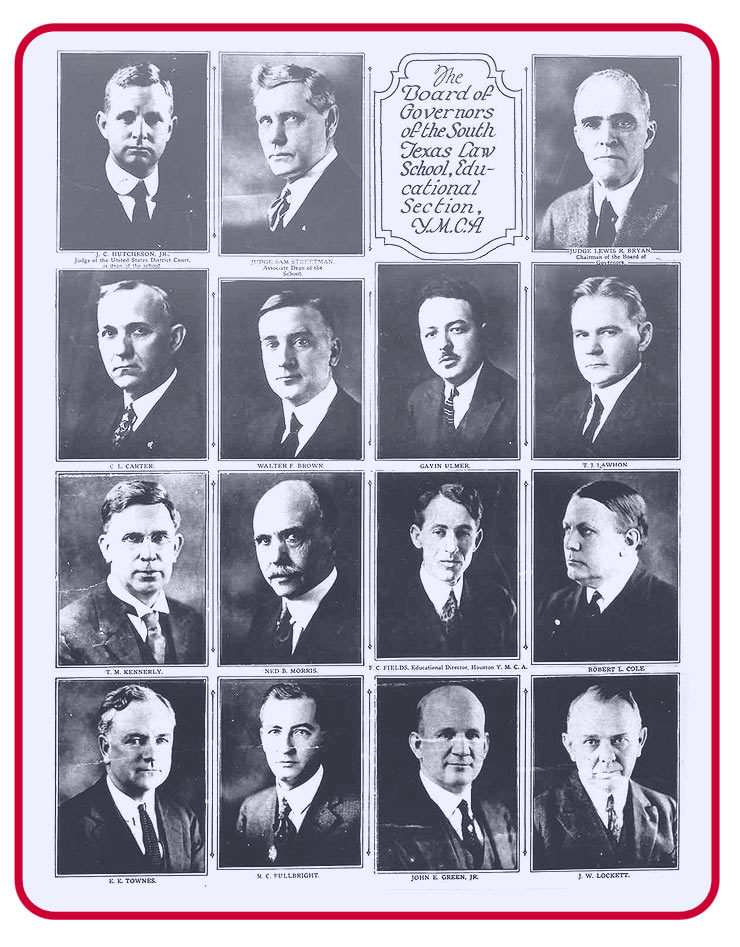
The original Board of Governors is pictured in this composite photograph, circa 1923. The school was formed and governed by some of Houston’s most illustrious attorneys. Although the school was located originally in the YMCA of downtown Houston, South Texas College of Law became independent in January, 1967. In 2016, the name of the school changed to South Texas College of Law Houston.
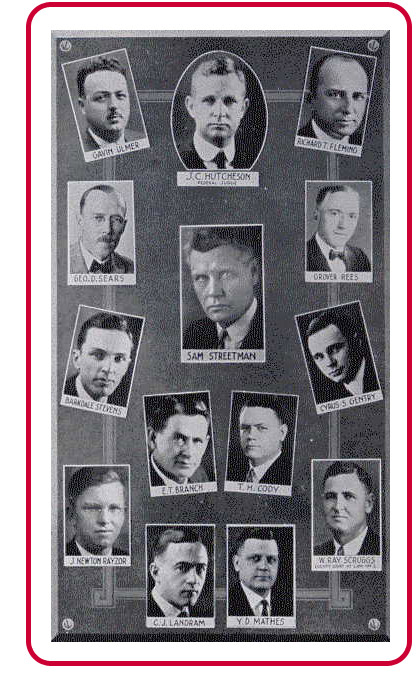
Our faculty over the years has included some of the most distinguished legal experts in Texas and the United States. Included in this 1926-1927 faculty photo are:
J. C. Hutcheson, Jr. (1879-1973), one of the founders of STCL and the first Dean, was Federal District Judge and later Chief Justice of the U.S. Fifth Circuit Court of Appeals;
Sam Streetman (1870-1933), one of the founders of STCL and the second Dean, was formerly County Judge of Milam County, then a judge on the Texas Third Court of Appeals, and later a named partner with the law firm of Andrews, Ball and Streetman, now known as Andrews & Kurth;
Gavin Ulmer (1895-1962), one of the founders of STCL and Assistant Dean, was an Instructor at STCL for 30 years. He was a solo-practitioner in Houston and President of the Houston Y.M.C.A., 1934-1948;
E. T. Branch (1876-1951), one of the state’s top experts in criminal law, and author of Branch’s Annotated Penal Code, served as Harris County Assistant District Attorney and also District Attorney, and was part of the commission that recodified the criminal law of Texas in 1925;
J. Newton Rayzor (1895-1970), in 1927 formed one of the most important Admiralty law firms in Houston, Royston & Rayzor, and also started a shipping firm, and later was a generous supporter of higher education in Texas;
George D. Sears (1888-1959), attorney and later General Counsel of the Houston Pipeline Company and Houston Oil Company, who later also practiced with the well-known Houston law firm of Williams, Lee, Hill, Sears & Kennerly;
Barksdale Stevens (1893-1956), practiced law with the well-known Houston firms of Baker Botts and Vinson & Elkins before becoming a trial attorney for Shell Oil Co., and later was a law professor at the University of Houston;
T. H Cody (1887-1957), was an Assistant U.S. Attorney in Houston, then practiced law with the firm of Fulbright & Jaworski, and later was a judge on the Texas First Court of Appeals for twenty years;
Y.D. Mathes, practiced law in Houston for over thirty-five years;
Richard T. Fleming (1890-1973), was President of the Houston Bar Association in 1925, before he went to New York with Texas Gulf Sulphur Company, eventually becoming Vice-President and General Counsel;
Grover Rees (1891-1994), an attorney in Houston for Baker Botts and then Bryan, Hutcheson & Dyess, and then in 1927 became an attorney for Gulf Oil Corporation in South America, later moving to Pittsburgh as Gulf’s General Counsel for Europe and South America;
W. Ray Scruggs (1895-1970), Assistant City Attorney for Houston, then a judge on Houston’s County Court at Law for five terms, later First Assistant City Attorney for San Antonio, and finally Assistant Attorney General of Texas.
Conrad J. Landram, attended Harvard Law School, 1915 to 1917, and completed his legal training at the University of Texas before practicing general and corporate law in Houston beginning in 1919, and served as part of the faculty from 1924 to 1945.
Cyrus S. Gentry, held three degrees including a law degree from Oxford University and taught constitutional law and common law actions as part of the faculty from 1925 to 1934.
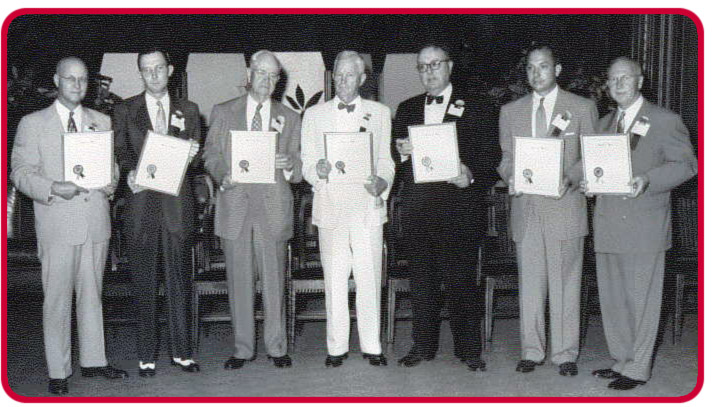
This image, from June 14th, 1953, shows several individuals from the Houston Y.M.C.A. South Texas Colleges being honored for their years of service to the Y.M.C.A.
The individuals being honored are (L-R): Judge Spurgeon Bell (1908-1996), being honored here for 15 years of service, served as a faculty member in the South Texas College of Law for over fifty years and as Chairman of the law school’s Board of Trustees. Bell was an attorney and then Judge for the 125th Civil District Court, 1953-1957, and later Associate and Chief Justice of the Texas First Court of Appeals, 1957-1973;
D. H. Gregg (1911-1985), being honored here for 10 years of service, was an Instructor at South Texas from 1939-1962 and also served on the South Texas Board of Trustees. He practiced with the firm of Baker Botts from 1935-1938, and then with Humble/Exxon from 1938-1976, becoming Associate General Counsel. He was of counsel to the firm of Fulbright & Jaworski, 1976-1983;
E. E. Townes (1878-1962), being honored here for 25 years of service, was one of the founders of South Texas College of Law and served as its third Dean from 1934-1960. Townes wrote the original charter and helped form Humble Oil and Refining Co. in 1917, later becoming General Counsel and Vice-President of Humble/Exxon, until his retirement in 1943. Townes then practiced law with his son Edgar E. Townes, Jr., from 1943-1962;
Judge J. C. Hutcheson, Jr. (1879-1973), being honored here for 25 years of service, was one of the founders of South Texas College of Law, and served as first Dean of the law school, 1923-1931. Hutcheson served as a Federal District Judge and later Chief Justice of the U.S. Fifth Circuit Court of Appeals;
Gavin Ulmer (1895-1962), being honored here for 25 years of service, was one of the founders of South Texas College of Law, served as Assistant Dean of the law school, and was also an Instructor in the school for 30 years. He was a solo-practitioner in Houston and was President of the Houston Y.M.C.A., 1934-1948;
W. J. “Joe” Williamson (1912-1997), being honored here for 10 years of service, served as a faculty member at South Texas College of Law and then at the University of Houston Law Center, and later returned to South Texas College of Law as its sixth Dean, 1984-1989. Williamson was an attorney for Shell Oil and Pipeline Cos. from 1941-1972, rising to the position of General Counsel, Director and Corporate Secretary;
William Herman Randolph, being honored here for 10 years of service, was Educational Director for the Houston Y.M.C.A. from 1943-1959, overseeing the South Texas Colleges of Law, Commerce, and Junior College. The South Texas College of Commerce merged with the Junior College in the 1950s. The South Texas Junior College became the University of Houston-Downtown in 1974.
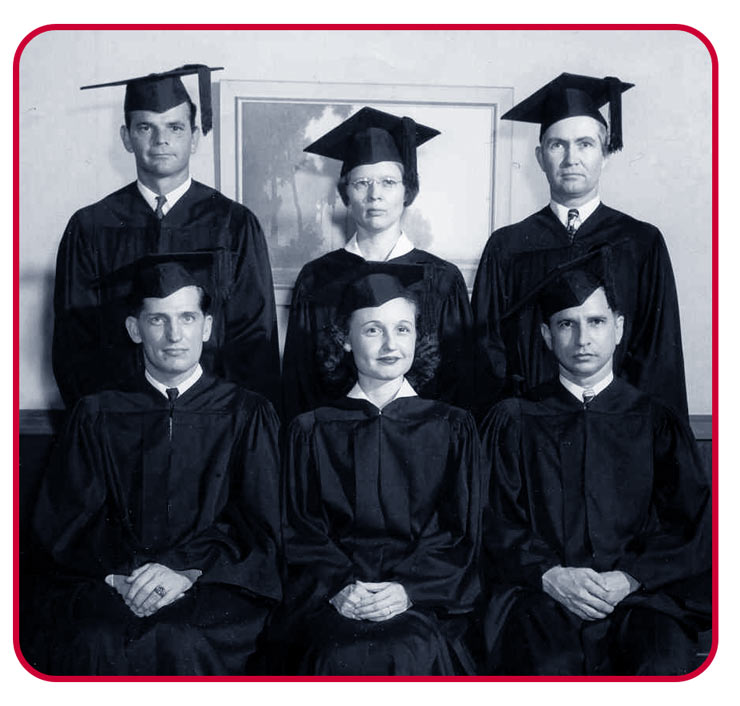
Due to wartime pressures, graduating classes during W.W.II were small. This group of aspiring attorneys graduated in June, 1947.
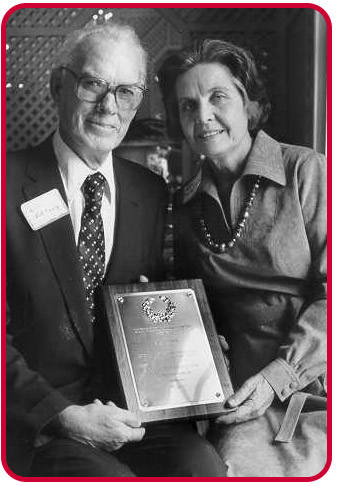
Congressman Bob Casey (1915-1986) and his wife Hazel are shown here in a 1981 photograph when Congressman Casey was awarded the South Texas College of Law Distinguished Alumnus Award.
Congressman Casey was a member of the class of 1940, and was elected to Congress in 1958, serving until 1976, when he resigned to become a Commissioner of the Federal Maritime Commission, 1976-8.
Casey started as a practicing attorney in Alvin, Texas, and also served eight years as Harris County Judge (1950-1958), four years as Harris County Assistant District Attorney (1943-1947), two years as Alvin City Attorney (1942-1943), and two years as a Texas legislator (1948-1949).
Casey was the first person elected to Congress from the 22nd district of Texas. In 1980 the federal building at 515 Rusk St. in downtown Houston was named for him.
Casey served on the Board of Trustees at South Texas, and also was a founding Director of the South Texas Law Review. Casey and his wife established a scholarship at South Texas in 1985 to help students defray costs while attending South Texas.
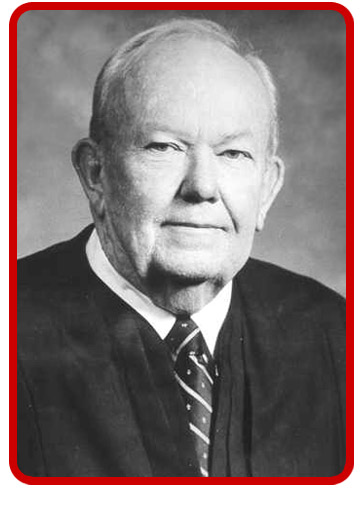
Judge Phillip Baldwin (1924-2002) was a member of the class of 1952, and was Assistant District Attorney, then Criminal District Attorney of Harrison County, Texas, 1953-1958, and was in private practice in Marshall, Texas, 1959-1968.
Baldwin then was appointed to the U.S. Court of Customs and Patent Appeals, which later changed names to the U.S. Court of Appeals for the Federal Circuit, from 1968 until 1991. Judge Baldwin was named South Texas’ Distinguished Alumnus of the Year in 1984.
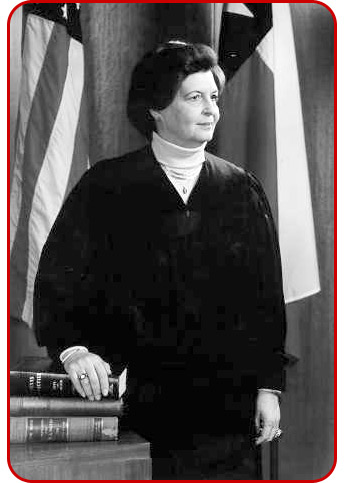
Judge Joe Kegans (1927-1997), a member of the class of 1957, was a pioneer in Texas criminal law, becoming the first woman serving as a criminal district court judge in Texas in 1977.
Kegans held the judgeship for twenty years until her death in 1997. Kegans spent two decades practicing criminal law, then a field dominated by men, before being appointed to the 230th Criminal District Court by Texas Governor Dolph Briscoe.
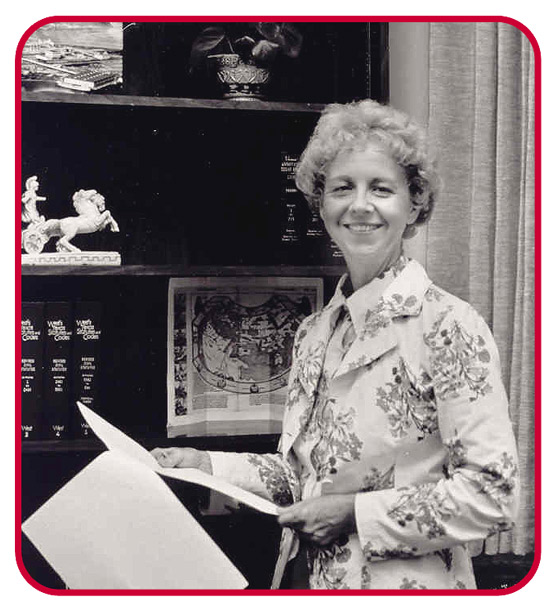
Jane Yount graduated with the Class of 1958, and became an outstanding international lawyer. Ms. Yount was the first woman to receive the Distinguished Alumnus Award and was the first woman to be elected to the Board of Directors of the South Texas Law Journal, Inc. She died in 1991.
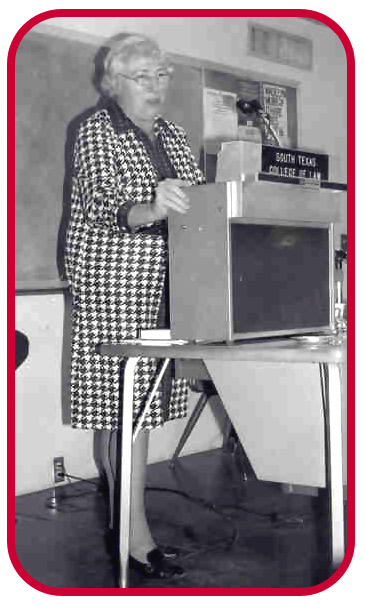
Madalyn Murray O’Hair attended South Texas College of Law in the early 1950’s. She founded American Atheists, and devoted her life to clarifying the distinction between church and state. She presented her views in lectures at South Texas in 1975 and again in 1995, which is the year she died.
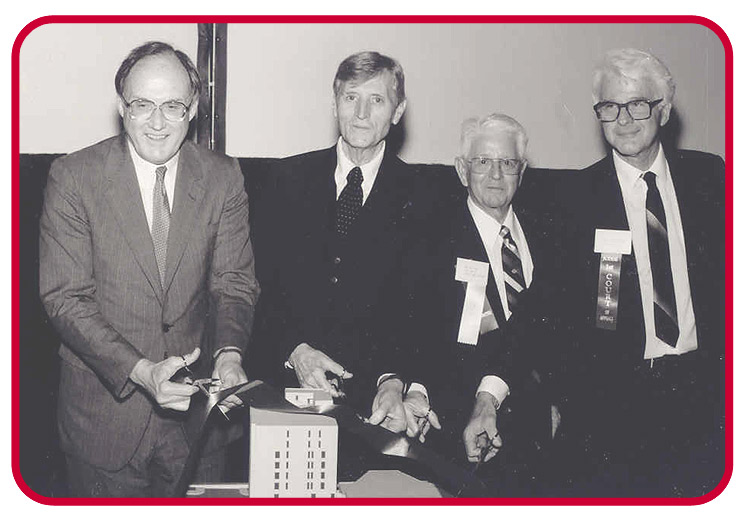
U.S. Supreme Court Associate Justice William Rehnquist (later Chief Justice – far left) cuts the ribbon at the tower building dedication on May 2, 1984. Also, (from left to right) Dean Garland Walker, Texas Supreme Court Chief Justice Jack Pope, and Texas First Court of Appeals Chief Justice Frank G. Evans.
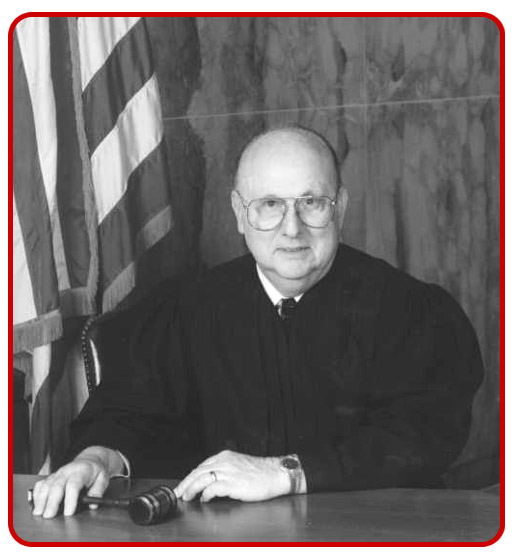
Judge Norman W. Black (1931-1997), was a long-time Adjunct Professor at South Texas (1975-1996) who won two awards for teaching excellence. He previously was an adjunct at the University of Houston Law Center, 1970-1975.
Judge Black was a graduate of the University of Texas School of Law, and served as an Assistant United States Attorney, and later entered private practice for a number of years. He served as a United States Magistrate for the Federal District Court for the Southern District of Texas from 1976-1979, and finally as United States District Judge and Chief Judge (1992-1996) for the Southern District from 1979-1997.
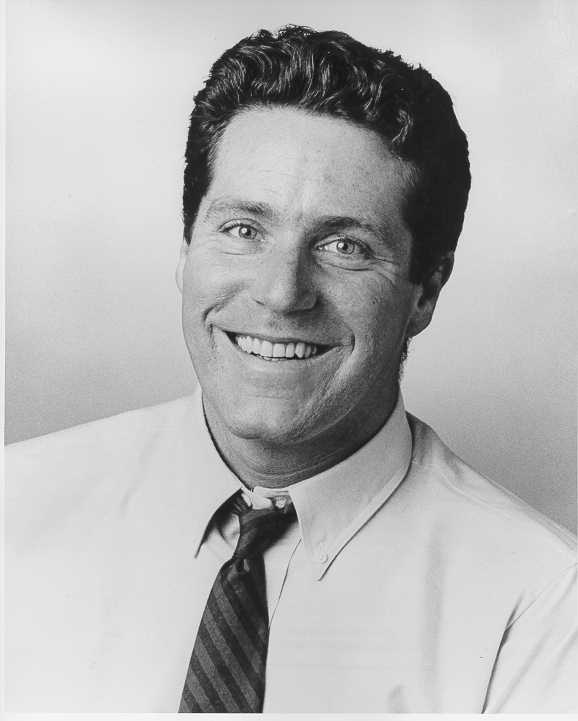
Richard Rouilard (1953-1996), class of 1978, co-founded the National Gay Rights Advocates of San Francisco in 1979, which was the first public interest law firm for lesbians and gay men in the United States. In 1981, he moved to Los Angeles, and began a journalism career that included being editor-in-chief of The Advocate, a nationally distributed magazine for the lesbian, gay, bisexual, and transgender community. As editor-in-chief of The Advocate, Rouilard nearly tripled circulation, and upgraded the magazine’s layout and journalistic standards. He also served as society and style editor for the now-defunct Los Angeles Herald-Examiner, and was a senior editorial consultant and contributor to the Los Angeles Times Magazine. Rouilard also was a founder of the National Lesbian and Gay Journalists Association.

